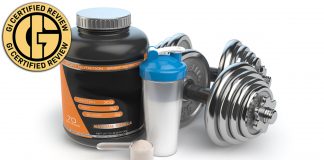
Work for bigger gains with better focus and attention.
Working to establish a strong link between your mind and your body is crucial to staying focused during training to maximize your full potential. While we all train hard in the gym, we are often left unsatisfied by our lift leaving us frustrated and wondering why we can’t seem to get a good pump.
While weightlifting and strength training are obviously rigorous physical workouts, the psychological part of lifting and staying fit is often overlooked. Too often we take for granted our mind’s capacity to put in serious work to work out our muscles, and while many of us have convinced ourselves that we can push through mental walls and difficult exercises, it doesn’t mean we have mastered our mind-muscle connection.
For those who feel like they show up to the gym and just get through a workout in hopes of seeing gains, unfortunately you are not fully maximizing your time in the gym. After a long day, your mind can wander and thoughts of relationships, financial problems, and personal matters can get in the way of a good, solid lift.
While all of those things are important, so many distractions can hurt your progress and leave you feeling unfulfilled. Use your time in the gym as a release from the stresses and pressure of everyday life and focus on the one thing you can control in that moment: your gains.
What is Mind-Muscle Connection?
Mind-muscle connection is the ability to release yourself from all unnecessary distractions and focus on your time working out, in particular, about a specific muscle that you target and work through with a specific movement. While this is possible with any muscle, it is wise to start with a bigger muscle group to get used to how it feels.
Your brain controls your muscular contraction and once that signal is sent to your brain, your mind meets your muscle at something called the neuromuscular junction (1). Getting better at this communication will recruit more muscle fibers to aid in your lift and you will start to see big gains with your muscles and growth.
How well your brain concentrates on specific activities during a set amount of time is your focused attention. Internal focus is your ability to focus on specifically what your body is doing and feel each muscle work. External focus is your minds relationship to your environment, so what equipment you are using, how you are using it, and a host of other distractions that take up attention space.
For mind-muscle connection to work efficiently, you need to focus more on that internal focus and give your muscles the attention they deserve. You will see substantial growth and development (2) and you will be glad you figured out mind-muscle connection to build those muscles.
Why Is It Important?
Mind-muscle connection is important because it allows you to be committed to every rep. And that is all we want. We want to know we entered the gym, took time out of our day to be healthy and get strong, and are getting the best results as possible. Mind-muscle connection may be easy to get the hang of with larger muscles, but it is the smaller, more secondary muscles that this will really help with.
As big components of how our bodies are made up with real pull over our body composition and physique, these secondary muscles cannot, and should not, be overlooked. Mind-muscle connection will help you reach your goals faster by boosting your energy, burning calories and building more muscle (3). Like anything, it takes practice to get this right and to start feeling the benefits, but with hard work, mastering mind-muscle connection will pay off with more attention for each exercise.
How To Develop Strong Mind-Muscle Connection
Training Cues
Having a good training cue will help keep you on track and improve your process with both your brain and muscle contraction. You can use these for any exercise or workout and feel free to have the creative license to do whatever works best for you.
An example for the bench press could be something like TBD: Tight. Breathe. Drive. This will help maximize the movement and keep you engaged with that specific exercise with more attention. Whether this is by yourself, with a training partner, or a personal trainer, having helpful cues will provide great benefits for your mind-muscle connection and each exercise and each contraction to make use of every workout for greater growth.
Lighter Weights
Using lighter weights will help you feel the muscle you are working better. Lighter weight with higher reps allows you to target a specific muscle and feel it working without the added strain of heavy weight, like the bench press, which can take all your focus to just simply lift. Having full control of your mind and the respective movement will let you recruit more muscles and give them attention and see more growth.
Using resistance bands is also a great way to build and target muscle (4) while focusing on mind-muscle connection and building muscle fibers through each exercise and activation to perform movements to simply perform trying to slow your movements. This can enhance your mental ability as well.
Slower Reps and Reset
Going along with lighter weights, performing an exercise slower allows for maximum concentration with each movement (5). Take a little bit longer with each rep and give those muscles a good squeeze at the top. Focus also on resetting after each rep. Too often do we hustle through an exercise, but resetting will allow you to focus more on each respective rep and get the most of every lift to really build those muscle fibers and strength training to really want to make gains with your muscles with great workout force.
Have Confidence & Patience
Building mind-muscle connection requires confidence and patience and although it may be frustrating at first, don’t let that deter you from really working at it. With increased progress, it will become easier to focus more and that consistency will pay off after repeated attempts and practice.
Wrap Up
Many of us lift big and think we will see great muscle growth just by showing up. While that is a key ingredient in a workout cocktail, building mind-muscle connection will maximize those gains and allow for much greater growth when it comes to muscle and strength building.
By targeting secondary muscles, mind-muscle connection will let your physique pop and you will look and feel great to get you back to full force. Training cues, lighter weight, and slower reps are all great places to start when focusing on this and having confidence and patience will only add to your ability to grow and see those big gains become a reality with the right amount of press, both with an internal mindset and external workouts.
Let us know what you think in the comments below. Also, be sure to follow Generation Iron on Facebook, Twitter, and Instagram.
*Images courtesy of Envato
References
- Deschenes, Michael R.; Maresh, Carl M.; Kraemer, William J. (1994). “The Neuromuscular Junction: Structure, Function, and its Role in the Excitation of Muscle”. (source)
- Schoenfeld, Brad Jon; Vigotsky, Andrew; Contreras, Bret; Golden, Sheona; Alto, Andrew; Larson, Rachel; Winkelman, Nick; Paoli, Antonio (2018). “Differential effects of attentional focus strategies during long-term resistance training”. (source)
- Calatayud, Joaquin; Vinstrup, Jonas; Jakobsen, Markus D.; Sundstrup, Emil; Brandt, Mikkel; Jay, Kenneth; Colado, Juan Carlos; Andersen, Lars Louis (2016). “Importance of mind-muscle connection during progressive resistance training”. (source)
- Dayne, Andrea M.; Nuzzo, James L.; McBride, Jeffrey M.; Burr, Alan; Triplett, N. Travis (2010). “Effect Of Elastic Band Resistance Training”. (source)
- Wilk, Michal; Golas, Artur; Stastny, Petr; Nawrocka, Monika; Krzysztofik, Michal; Zajac, Adam (2018). “Does Tempo of Resistance Exercise Impact Training Volume?”. (source)




















